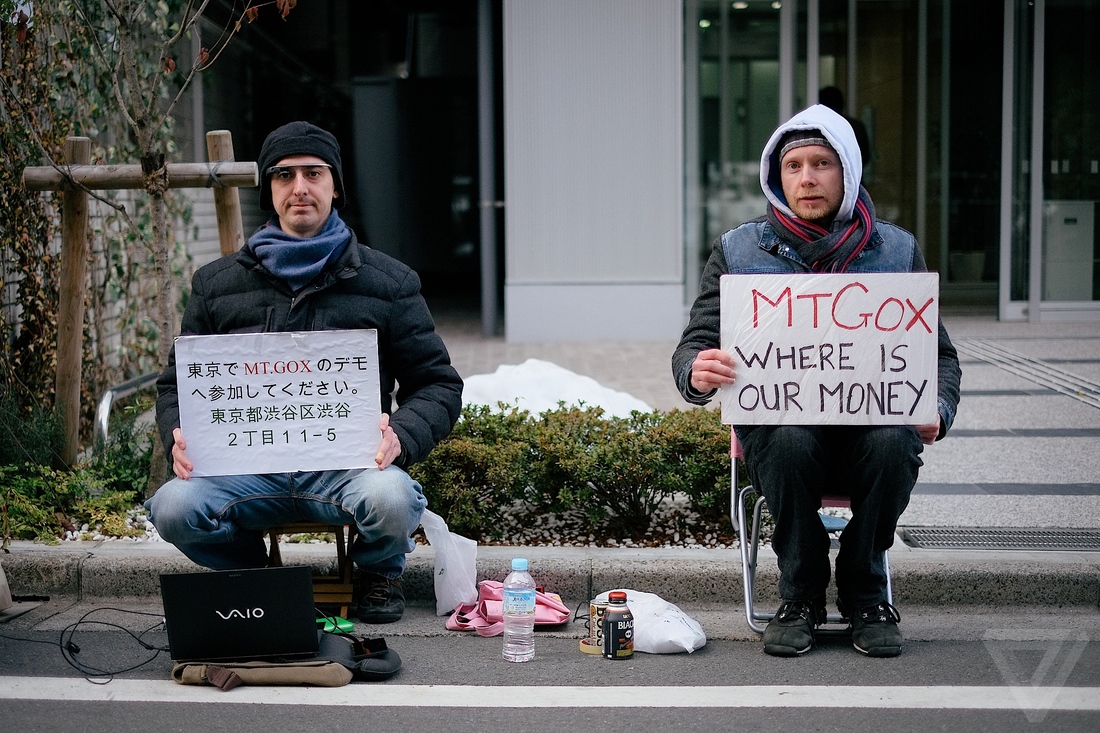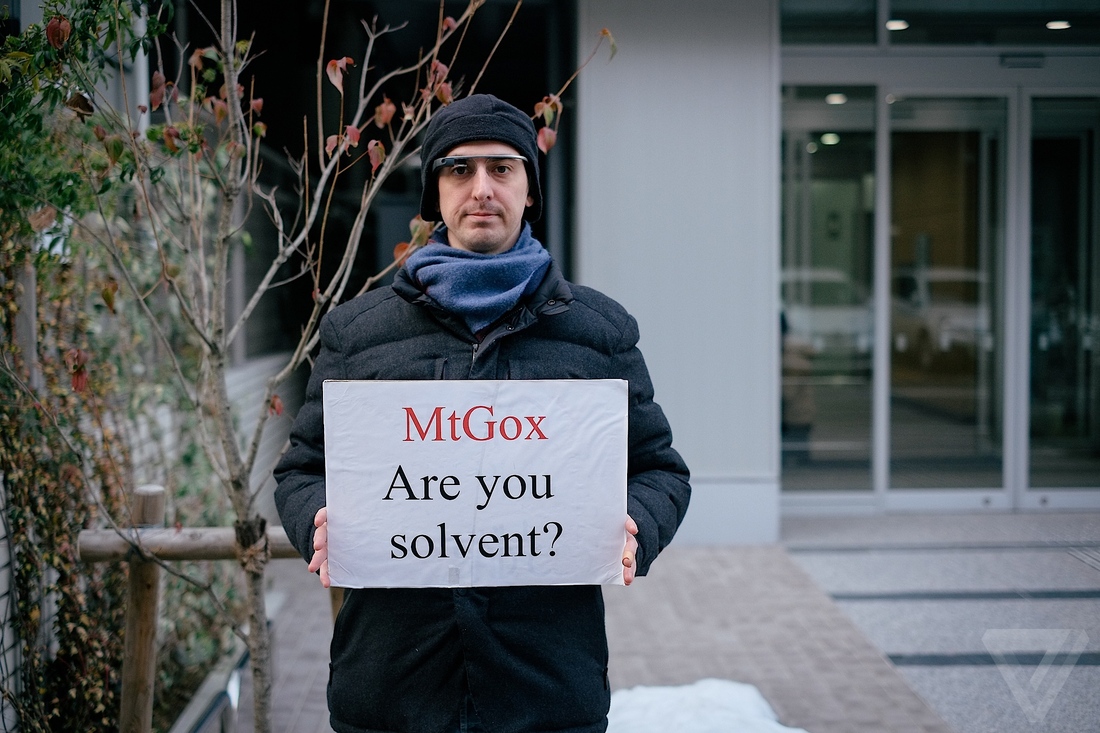Mt. Gox, once the largest Bitcoin exchange in the world, is operated from an unmarked Tokyo office block that offers no indication of its major, controversial influence on the digital currency's health. No indication, that is, unless you've walked past the headquarters in the past week, where protesters are attempting to draw unwelcome attention to the company's existence. "Mt. Gox: Where is our Money," reads one sign. "Mt. Gox: Are you solvent?" reads another. What's going on?
"It's pretty much secretive."
Bitcoin trader Kolin Burges started the protest last week, flying from London to seek answers about Mt. Gox's ongoing moratorium on withdrawals. Although Bitcoin's market price is volatile, the currency has nearly halved in value at Mt. Gox from $950 earlier in the month to $558 today, sparked by a crisis in confidence in the exchange's solvency. Burges started staking out the headquarters on Friday, a day that saw heavy snowfall hit Tokyo for the second time in a week, and, despite brief confrontations with Mt. Gox CEO Mark Karpeles, is continuing the protest. "It's pretty much secretive," Burges tells The Verge. "There's no real statements about whether they still have people's money, or whether they're solvent." Burges, who has 250 bitcoins in his Mt. Gox account, says he plans to keep up the protest until he gets an answer.

Kolin Burges (right) and Aaron outside Mt. Gox's Tokyo headquarters.
According to Mt. Gox, the problem isn't solvency but a transaction malleability bug within Bitcoin itself. The bug has also halted trading at Bitstamp and is allegedly responsible for a $2.7-million-dollar theft from the Silk Road's escrow service. The bug is patchable — other exchanges that had already addressed the bug were completely unaffected — and the Mt. Gox team is already implementing a fix, but it's unclear how many unauthorized withdrawals had been made before Mt. Gox turned off the tap. If there was an unreported theft on a Silk Road scale, the exchange might not have the money to cover it, leaving traders like Burges out in the cold.
A second protester, who wishes only to be identified as Aaron, has joined Burges' crusade. "I have serious concerns about the solvency of Mt. Gox," says Aaron, who lives in Tokyo and has 463 bitcoins stored at the exchange. "They are unwilling to state that they have all the funds which are held in the customer accounts, so my question to them is, 'Why can't you demonstrate that these funds are there?'" Aaron was wearing Google Glass when he spoke to The Verge, and used the headset to capture first-person footage of Karpeles arriving to work in a taxi earlier today (below). The two protesters have also been live-streaming their activities.
< >
The pair's issue is as much with Mt. Gox's lack of communication as the technical fault that led to the halted withdrawals. Mt. Gox's radio silence stands in stark contrast to the plaudits and community trust it won in 2011, when it issued frequent updates and offered to replace lost money after suffering a major hack.
"I think a lot of people will give [Mt. Gox] a lot more credit and be a lot more accommodating of their technical problems if they would be willing to be very transparent about any losses or lack of losses," says Aaron. "If they're solvent then I think you're going to get a lot more positive viewpoint from the community. Instead they've been very opaque, they are very unwilling to make even the most simple statement about their solvency." The Verge contacted Mt. Gox and Karpeles for comment on this story, but emails were not returned by the time of publication.
"I have no intention of giving them any more business."
Although the value of the bitcoins stored in Mt. Gox has plummeted, the protesters are more concerned with getting them back at all. "If they have all of the bitcoins, as long as they even say that, the price is going to double," says Aaron. "Just the promise and prospect of withdrawal is sufficient to double the price instantly." In other words, if Mt. Gox is able to return the bitcoins at all, this will restore the traders' lack of confidence that caused the price to nosedive in the first place.
Unsurprisingly, though, neither protester is in a hurry to resume normal service with Mt. Gox. "I would take [the bitcoins] somewhere else [and] put them in some other exchange, but I'd be more careful," says Burges. "I'd be more careful about the exchange itself, find out about it, make sure it seems safe and reputable, and I'd probably put some of them into cold (offline) storage so that they're safe."
"I think there's a lot of moral hazard with giving them trading revenue that they are not deserving of, given that they've been poor stewards of our business," agrees Aaron. "I have no intention of giving them any more business."

Mt. Gox's prior status as the largest and most visible Bitcoin exchange has no doubt lent it some appearance of safety and security in the past, a point that Burges concedes. But that's not to say that there aren't better ways for Bitcoin exchanges to demonstrate their reliability to traders. "There are technical means by which they can provide digital signatures of their holdings and demonstrate solvency," says Aaron. "I think what this is going to create will be an opportunity for new exchanges that are going to be more transparent or use various reinsurance and so forth to ensure that they will be able to return the funds, even if they do have a technical problem."
For the two protesters, however, it may be too late — they put their chances of getting their bitcoins back at between 20 to 33 percent. "I did believe at the time that [Mt. Gox] was reputable, but obviously I Googled afterwards and realized that actually there were a lot of issues with it," says Burges. "If I'd known that first before I'd put money in then I wouldn't have done it." Aaron agrees: "To some degree I can only blame myself. I was aware that there were issues at Mt. Gox — I didn't expect them to be this severe, obviously, or I wouldn't have done business with them."
Russell Brandom contributed to this report.
:format(webp)/cdn.vox-cdn.com/uploads/chorus_asset/file/14627311/DSCF4055.0.1416987238.jpg)